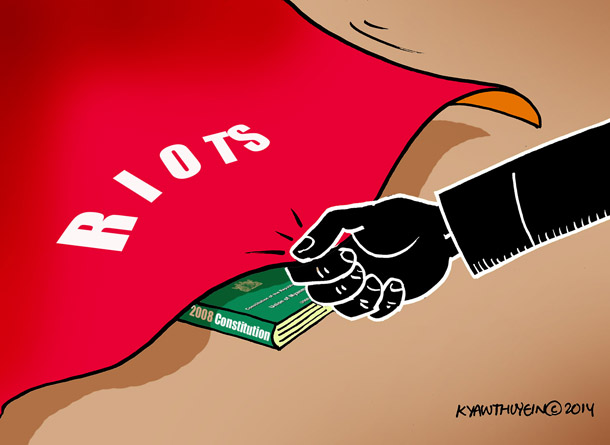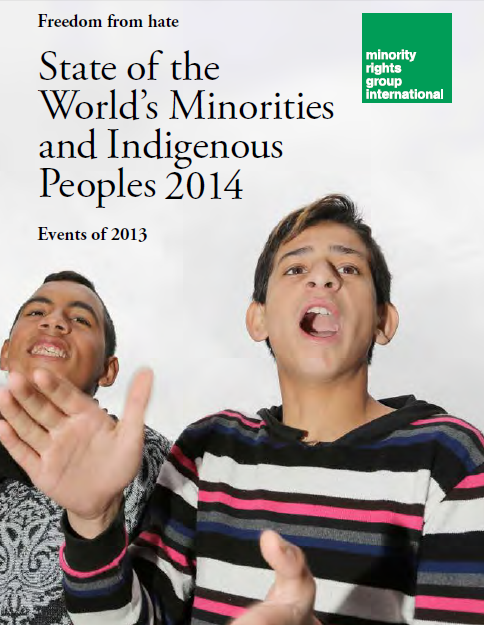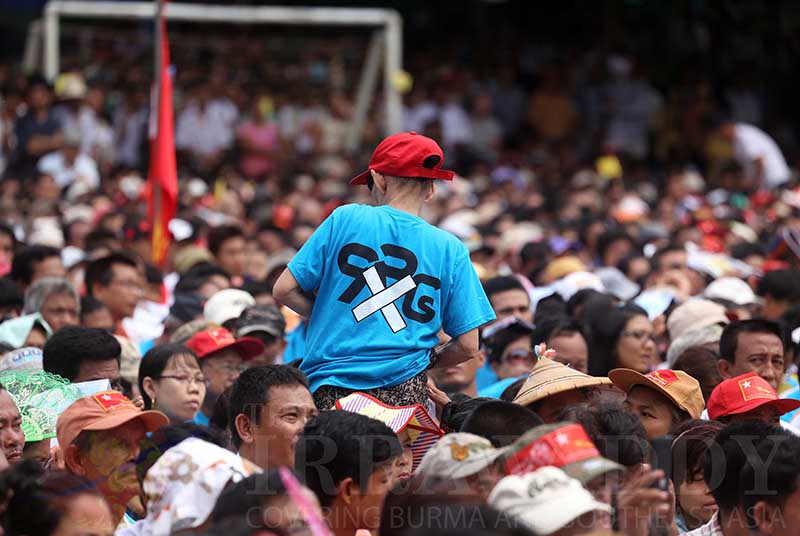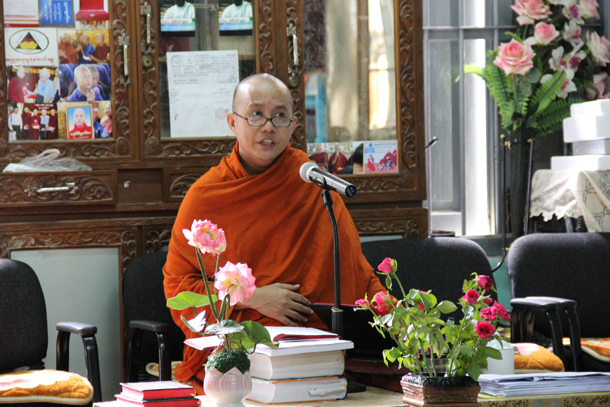Posts Tagged ‘Human Rights Watch’ (162 found)
Burma/US: Kerry Should Press Rights Concerns
(New York) – US Secretary of State John Kerry should press the Burmese government during his upcoming visit to reverse Burma’s deteriorating rights situation, Human Rights Watch said today. Kerry is scheduled to visit Burma from August 8 to 10, 2014, to attend meetings of the Association of Southeast Asian Nations (ASEAN) and the ASEAN Regional Forum (ARF) […]
• • •Burma Must Find a Path to a More Tolerant Society
 The streets of Mandalay, which just recently drew over 20,000 people in support of National League for Democracy and 88 Generation Peace and Open Society’s joint campaign to amend Section 436 of the Constitution in support of democratic reform, remain deserted this last week as many business owners closed their shutters in fear, following serious unrest in the city. In the second largest city in Burma, violent mobs took over the streets, leaving two people dead and dozens injured. Some stated that over “70 police were here but did nothing,” as Buddhist mobs torched a school in a Muslim area. Ironically the international community has mostly stayed silent in the wake of the recent events when their actions are needed to protect the people of Burma, especially the most vulnerable communities, more than ever.
The streets of Mandalay, which just recently drew over 20,000 people in support of National League for Democracy and 88 Generation Peace and Open Society’s joint campaign to amend Section 436 of the Constitution in support of democratic reform, remain deserted this last week as many business owners closed their shutters in fear, following serious unrest in the city. In the second largest city in Burma, violent mobs took over the streets, leaving two people dead and dozens injured. Some stated that over “70 police were here but did nothing,” as Buddhist mobs torched a school in a Muslim area. Ironically the international community has mostly stayed silent in the wake of the recent events when their actions are needed to protect the people of Burma, especially the most vulnerable communities, more than ever.
The series of events began on 1 July, just hours after the extremist Buddhist monk, and leader of the anti-Muslim 969 movement, Wirathu, picked up a questionable post from the social media site Facebook that highlighted an alleged rape of a Buddhist woman committed by two Muslim brothers. According to David Mathieson, a senior researcher for Human Rights Watch, Wirathu, who is based in Mandalay, appeared to have played “a pivotal role” in inciting the unrest, fanning tensions by spreading accusations with religious inferences, while calling for action against the two Muslim brothers who own a teashop in the same area where his monastery is located […]
• • •State of the Word’s Minorities and Indigenous Peoples 2014
 Hate crime towards minorities and indigenous peoples is a daily reality across Asia but is often ignored by the governments of the region, Minority Rights Group International (MRG) warns in its annual report. This year’s flagship report, State of the World’s Minorities and Indigenous Peoples 2014, is themed around ‘Freedom from Hate’ and shows that a worrying trend of vilification and hostility towards minorities and indigenous peoples has spread across the region.
Hate crime towards minorities and indigenous peoples is a daily reality across Asia but is often ignored by the governments of the region, Minority Rights Group International (MRG) warns in its annual report. This year’s flagship report, State of the World’s Minorities and Indigenous Peoples 2014, is themed around ‘Freedom from Hate’ and shows that a worrying trend of vilification and hostility towards minorities and indigenous peoples has spread across the region.
A key aspect of hate crime and hate speech is its invisibility, especially when governments or societies overlook or tolerate entrenched patterns of discrimination against particular communities, says MRG. Across Asia, governments have failed to provide adequate protection to its minority and indigenous populations.
“Hate crimes have been able to flourish in Asia largely as a result of the complicity or support of politicians who stand to gain from the persecution of minorities,” says Mark Lattimer, MRG’s Executive Director. “Hate speech goes unchallenged and crimes are often under-acknowledged and under-reported, enabling perpetrators to operate with impunity.” […]
• • •Calls for DFID Burma Census Inquiry Top 1,000
More than a thousand people have written to Justine Greening, Secretary of State for International Development, calling for an inquiry into why the Department for International Development (DFID) spent 10m on Burma’s disastrous census earlier this year. DFID has not yet responded to these calls […]
• • •Thailand: Fears of Crackdown Trigger Exodus
(New York) – The Thai military authorities should urgently improve human rights protections of migrant workers to end their mass flight from the country, Human Rights Watch said today.
Following the military coup on May 22, 2014, several hundred thousand registered and unregistered migrant workers from Cambodia, Burma, and Laos have fled the country in fear of a government crackdown and newly announced regulations. More than 200,000 Cambodian workers […]
• • •Burma Must Amend the 2008 Constitution for the Reform to be Genuinely Democratic
 The National League for Democracy (NLD) and its leader Daw Aung San Suu Kyi, have faced intimidation from Burma’s electoral commission in recent weeks as the campaign to amend Burma’s 2008 Constitution continues to draw strong support throughout the country. As the public rallies behind the campaign, Burma’s ruling Union Solidarity and Development Party (USDP) have accused the campaign leaders of sowing public unrest and disorder.
The National League for Democracy (NLD) and its leader Daw Aung San Suu Kyi, have faced intimidation from Burma’s electoral commission in recent weeks as the campaign to amend Burma’s 2008 Constitution continues to draw strong support throughout the country. As the public rallies behind the campaign, Burma’s ruling Union Solidarity and Development Party (USDP) have accused the campaign leaders of sowing public unrest and disorder.
Last month, Daw Aung San Suu Kyi spoke to a crowd of over 20,000 supporters in Mandalay, calling on the military to forgo their fear of constitutional amendment in support of democratic reform. According to a recent statement from Human Rights Watch, the Union Electoral Commission (UEC) subsequently warned the NLD leader that such comments are illegal and unconstitutional, and could jeopardize her party’s re-registration ahead of by-elections in 2014. The NLD has responded to the UEC’s warning as inappropriate, owing to the fact that political parties are allowed to stage rallies so long as they are in accordance with the law.
• • •Burma: Election Body Intimidating Opposition
Burma’s electoral commission should immediately cease threatening and intimidating the opposition National League for Democracy (NLD) party, Human Rights Watch said. The electoral commission should also drop proposals that would set limits on future election campaigning, and President Thein Sein and the Burmese government should publicly reject such proposals […]
• • •Burma Parliament Must Reject Dangerous Religious Conversion Law
 The introduction of the draft Law on Religious Conversions (the Law) – published in full in Burmese in state media on 27 May 2014, for the consideration of Parliament and the public – has justifiably triggered a torrent of criticism over the past few days, at national, regional and international levels. Human Rights Watch has urged the Burma Parliament to drop the Law, while the Asian Human Rights Commission has called for “the strongest opposition to the Law, both in the public domain and in the legislature.”
The introduction of the draft Law on Religious Conversions (the Law) – published in full in Burmese in state media on 27 May 2014, for the consideration of Parliament and the public – has justifiably triggered a torrent of criticism over the past few days, at national, regional and international levels. Human Rights Watch has urged the Burma Parliament to drop the Law, while the Asian Human Rights Commission has called for “the strongest opposition to the Law, both in the public domain and in the legislature.”
Part of a package of four bills which comprise measures to “protect race and religion,” the Law is the product of a very powerful lobby in contemporary Burma, namely a coalition of Buddhist monks known as the “Organization for the Protection of Race, Religion and Belief” (the OPRRB), which has been petitioning President Thein Sein and the Burma Government to address the simmering issue of race and religion since religious and communal tensions first broke out in Arakan State almost exactly two years ago. One of the leaders of the OPRRB, Tilawka Biwuntha, told Radio Free Asia that his organization were pleased with the introduction of the Law.
• • •Burma: Drop Draft Religion Law
(New York) – Burma’s parliament should scrap a proposed religion law that would encourage further repression and violence against Muslims and other religious minorities, Human Rights Watch said today. The draft law on religious conversions, published in the state-run media on May 27, 2014, would impose unlawful restrictions on Burmese citizens wishing to change their religion […]
• • •Burma: A Tribute to U Win Tin
Human Rights Watch mourns the passing of U Win Tin, one of Burma’s most prominent human rights activists and journalists. A longtime journalist who later spent years as a political prisoner, he died of renal failure on April 21, 2014, at the age of 84 […]
• • •








 All posts
All posts